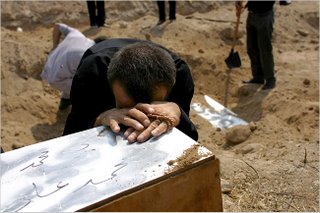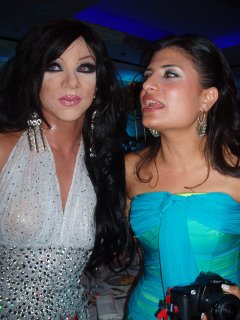"I love Beirut for its opposites. I love Beirut because I see a girl in a mini skirt and her sister in a tchador. I love Beirut because it is neither West nor East it is both. I love Beirut because one can party till 6 in the morning and not realize that it is tuesday morning. I love Beirut because Beirutis live as if they are going to die tomorrow and party as if they are going to live forever.
I love Beirut because I can be swimming in the morning and 30 minutes later I'm on the slopes skiing or doing apres ski. I love Beirut because I have never seen the sun this strong anywhere in the world.
I love Beirut because I can see 6,000 years of history. I love Beirut because Christians and Muslims are living an understanding and do not need to have Christian Muslim understanding classes. I love Beirut because every Beiruti has a political opinion and will share it with you even if you could care less about his and you want to share yours with him. I love Beirut for all the conspiracy theories and how many people actually believe them.
I love Beirut because any night I can find a friend to go out with. I love Beirut because I do not need to call my friends to go and see them at their houses I just stop by. I love Beirut because as soon as I arirve at one of my friends houses his mom takes me to the kitchen and becomes the spokesperson of the refrigerator. I love Beirut because one can smell gardenia , and jasmine. I love Beirut because strawberries taste like strawberries and fruits taste like fruits. I love Beirut because the food is so good that one gains so many pounds even if she tries to lose .
I love Beirut because although the Lebanese women at times look alike as some did their surgeries at the same plastic surgeon they are the most elegant women I have ever seen. I love Beirut because when I go out at night I don't know at which women to look at as each one is gorgeous in her wn way. I love Beirut because everyone knows me by name.
I love Beirut because I don't have to explain myself. I love Beirut because of the traffic jams and the people you meet because of them. I love Beirut because of the noise pollution from cars honking.
I love Beirut for the spirituality of the people whether Muslim or Christian. I love Beirut because I'm the first to call my Muslim friends on Ramadan and they are the first to call me on Easter. I love Beirut because on May 1st I see Muslims visiting Harissa ( Virgin Mary ) just like I see Christians. I love Beirut because we can differentiate between a Jew and an Israeli. I love Beirut because on the 22nd of every month I see Muslims going to Mar Charbel and believing that a miracle will happen.
I love Beirut because women look like as if they are out of a Vogue magazine. I love Beirut because you eat to live and live to eat. I love Beirut because one leaves one cafe to go to another and one does this all day.
I love Beirut because all the Lebanese living outside want to come back and the Lebanese who are in Lebanon envy the ones who are living abroad not realizing what it means to live away from Beirut.
I love Beirut because my sister , her husband are there and my niece and nephew who are 5 are waiting to see their uncle. I love Beirut because my niece asks me to bring her a pink skirt and tells me : "I love You".
I love Beirut because a girl or a guy can easily tell you I just had a couple of Lexo or Xanax as if they just had a chewing gum. I love Beirut because for every Lebanese we have a singer. I love Beirut because the Lebanese star singers sing in nightclubs. I love Beirut because women go into the swimming pool with full make up. I love Beirut because guys go in with their cigars.
I love Beirut because it has been destroyed 7 times in History and has risen. I love Beirut because since 1975 the Beirutis have withstood the PLO , Syrians , and the Israelis. I love Beirut because the Beirutis will not accept anyone to occupy them and rule over them. I love Beirut because we feel that it is better to die on our feet than to live on our knees.
I love Beirut because each street is a two way street even if it is a one way officially. I love Beirut because one can park anywhere and not get a ticket. I love Beirut because one can go as fast as his speedometer.
I love Beirut because MEA lands there. I love Beirut because on MEA we can clap in unison when we are about to land. I love Beirut not because it is my city , but because it is the city of every Lebanese. I love Beirut because it welcomes every exile freethinker , independent mind of the Arab world.
I love Beirut because we have hundreds of newspapers and our press is finally Free. I love Beirut because most Arabs dreams of coming to Beirut and wishes his capital was more like Beirut.
I love Beirut because when I explain Beirut to my Western friends, my friends see the passion of Beirut in my eyes. I love Beirut because there is so much misconception about Beirut in the media and in the minds of people who have never visited. I love Beirut because when I tell my friends that I'm going to Beirut they tell me can you take me with you.
I love Beirut because we argue over who is going to pay the bill at a restaurant as everyone wants to pay it. I love Beirut because although many whine about not making enough money everyone is living. I love Beirut because if I do the cross before I start driving the person next to me does not ask me if I fear that I'm going to get into a car accident but instead does his cross as well.
I love Beirut because we accept our differences as we disagree with each other. I love Beirut because it serves as a beacon of freedom to the rest of the Arab world. I love Beirut because to praphrase what Gibran said about Lebanon " Had Beirut not been my city I would have chosen it to be." I love Beirut because there is no city like it.
I love Beirut because even if Beirut is being destroyed you are still beautiful and will remain beautiful no matter how disfigured you are.
I love Beirut because you are always on my mind.
I love Beirut for no reason. I love Beirut for all the reasons of the world. "













